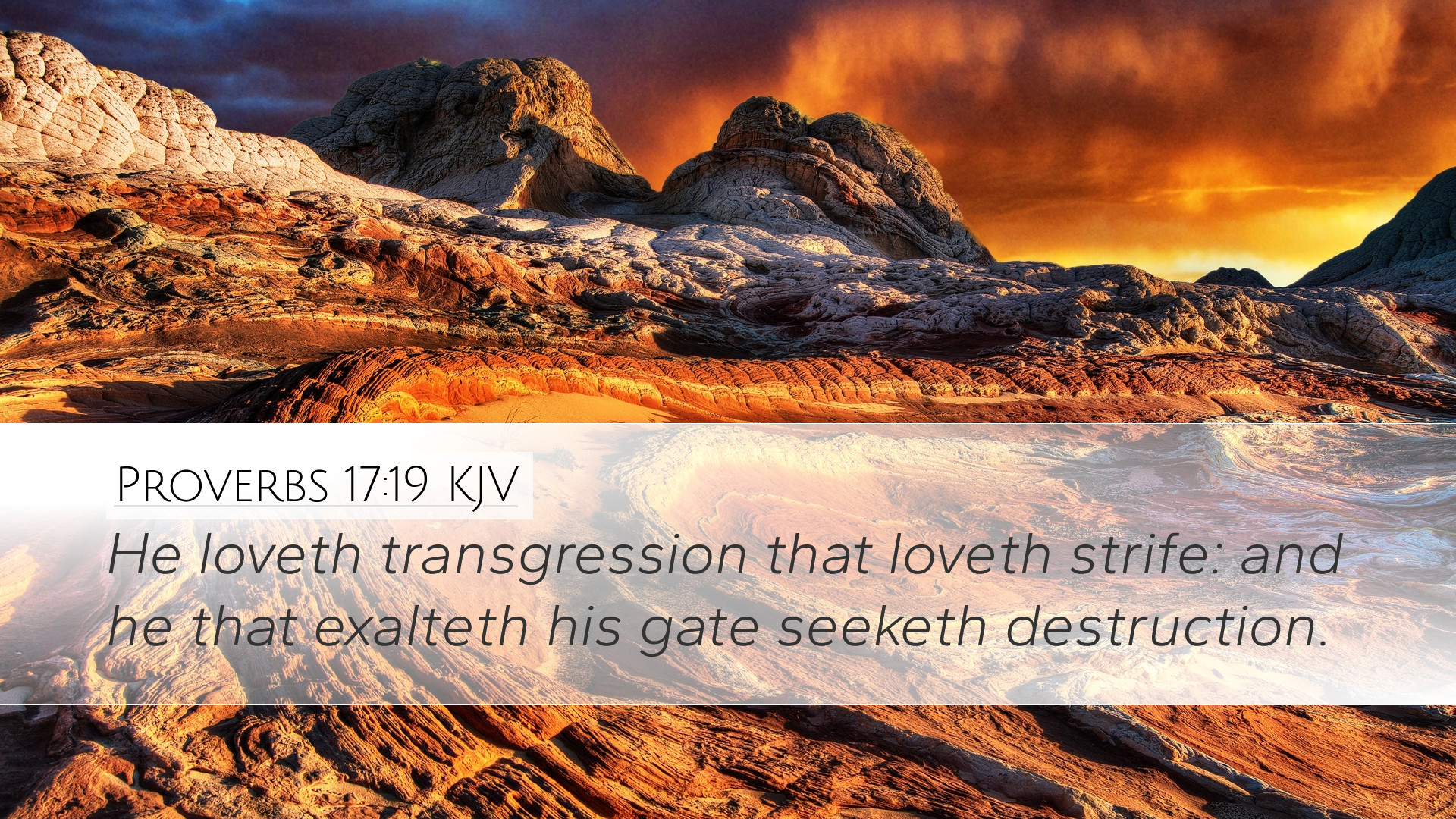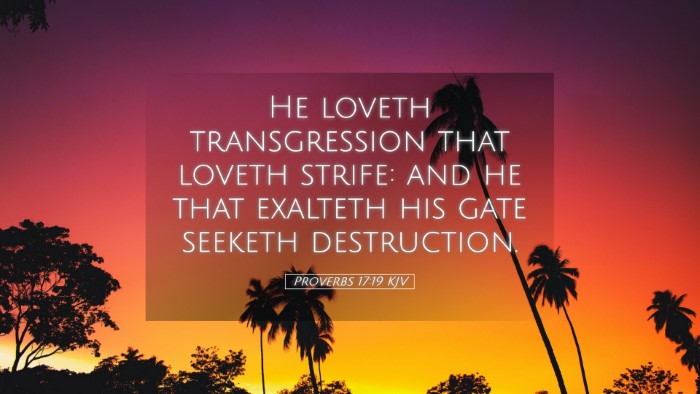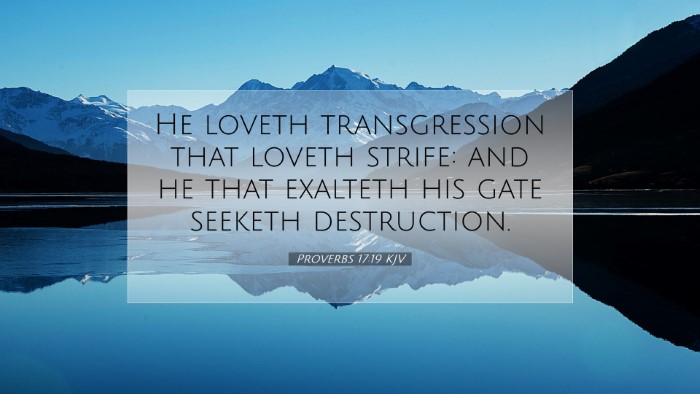Commentary on Proverbs 17:19
Verse Text: "He who loves transgression loves strife, and he who builds a high gate seeks destruction."
Introduction
The verse Proverbs 17:19 presents a profound principle that highlights the peril of engaging with sin and the consequences it brings into the life of an individual. Through examining this verse, we find rich insights from public domain commentaries, particularly from notable scholars like Matthew Henry, Albert Barnes, and Adam Clarke, which can aid pastors, students, theologians, and Bible scholars in understanding its deeper message.
Historical Context
Proverbs, traditionally attributed to King Solomon, serves as a collection of wisdom literature intended to guide individuals in making moral and ethical decisions. The context of this particular proverb stresses the dichotomy between wisdom and folly, emphasizing the outcomes of one's choices.
Understanding the Key Phrases
- “He who loves transgression”: This phrase indicates a penchant for sin and wrongdoing. It speaks to an inner disposition that not only condones but embraces immoral behavior.
- “loves strife”: The connection between loving transgression and loving strife suggests that those who engage in sinful behaviors are often embroiled in conflict, both internally and with others.
- “builds a high gate”: This metaphor can be understood as erecting barriers or defenses that symbolize pride and arrogance. Such individuals are often unapproachable and invite downfall through their hubris.
- “seeks destruction”: This highlights the self-destructive path of those who indulge in sin, essentially aligning their life choices with ultimate ruin.
Commentary Insights
Matthew Henry’s Perspective
Matthew Henry emphasizes the causal relationship between sin and strife. He notes that those who nurture transgressive inclinations inevitably attract conflict into their lives. Strife, as Henry suggests, becomes a natural consequence of a life given over to sin, reflecting the scriptural truth that sin often brings a host of complications, disputes, and dissatisfactions.
Henry further elucidates that a “high gate” signifies pride; it shields a person from external scrutiny and correction. Such attitudes lead to spiritual devastation as pride precedes a fall (Proverbs 16:18). Therefore, the love of transgression is not merely indulgence in sin but a predisposition towards conflict and destruction.
Albert Barnes’ Analysis
Albert Barnes provides a more nuanced view of the metaphorical implications of “building a high gate.” He interprets it as an illustration of how individuals, through their actions, establish themselves in a position of arrogance that alienates them from wise counsel and community. Barnes argues that engaging with sin not only breeds personal conflict but also social discord, as sin is inherently divisive.
Additionally, Barnes notes that the pursuit of self-exaltation leads to a precarious existence where the high-minded are left to face the consequences of their choices without the protection that humility garners. He reminds the reader that true wisdom often arrives through humility and the acknowledgment of one's need for righteousness.
Adam Clarke’s Commentary
Adam Clarke brings forth a reflective analysis on the intention behind the actions of those who embrace sin. He posits that there is an allure to transgression that entices individuals to seek excitement, yet this excitement is coupled with inevitable strife. Clarke's remarks remind us that engaging in sinful behaviors ultimately carries a high price.
Moreover, Clarke emphasizes an essential truth: those who think they are 'building' their lives—through pride—are, in fact, ensuring their downfall. His observations reflect the inherent foolishness of such pursuits and highlight the wisdom of the Proverbs that counsel humility as the pathway to safety and peace.
Theological Implications
Reflecting on Proverbs 17:19, it's crucial to consider the theological implications of sin's destructive nature. The love of transgression creates a cyclical pattern of conflict—sin leads to strife, and strife fosters more transgression. This underscores the necessity for repentance and a commitment to living a righteous life aligned with biblical teachings.
The Character of God
This verse also reveals something about the character of God. It illustrates His disdain for sin and the consequences that stem from human iniquity. God desires His creation to pursue righteousness, which is marked by peace rather than conflict. Thus, in the pursuit of holiness, believers are called to understand the consequences of their actions.
Reflection and Application
For pastors and educators, this proverb serves as a foundational teaching tool to highlight the dangers of sin and the importance of seeking wisdom. In instructing congregants, leaders should emphasize the significance of maintaining humility and an openness to correction, ensuring that the gate of one’s life is not built on pride.
For students and scholars, this verse invites deeper contemplation on the relationship between morality and ethics in daily life. It presents an opportunity to study the implications of Proverbs as a guide for character formation and community relationships. Understanding the dynamics of sin and pride encourages an academic pursuit of practical theology that inspires personal growth and ethical living.
Conclusion
Proverbs 17:19 stands as a potent reminder of the consequences of sin and the value of humility. The insights of Matthew Henry, Albert Barnes, and Adam Clarke converge on the principle that loving transgression leads not only to conflict but ultimately invites destruction. This wisdom calls for a thoughtful reflection on one’s life choices and offers a roadmap for walking in alignment with God's desires for peace and righteousness.


